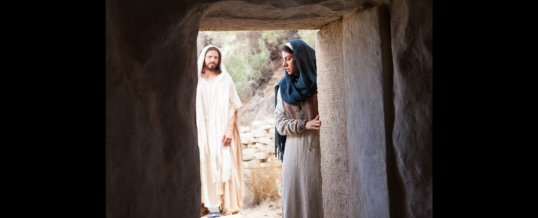
Although nobody witnessed the actual moment Jesus rose from the tomb, Mary Magdalene was the first to witness the Risen Lord. And, as a good disciple should do, she ran and told others. Those others told others who told others who told us. That’s how we come to be here this morning. But discipleship, whether it’s Mary Magdalene’s or our own, isn’t as simple as turning on a light switch. If you’re anything like me, on the road to becoming a disciple, a follower of Christ, you might feel like a saint one day and the worst sinner in the world the next day. Like any discipline in life, you have to work at it every day. Let’s look at John’s version of what happened that first Easter morning.
Mary Magdalene goes to the tomb early in the morning…alone. She notices the stone, sealing Christ’s tomb, has been removed. She doesn’t look in nor does she enter the tomb. Instead, she ran to report to Peter and the disciple Jesus loved (we assume John) and tells them this disturbing news. It’s kind of interesting that although she was alone at the tomb, she speaks in the plural. “They have taken the Lord out of the tomb, and we do not know where they have laid him.” Who is this “they” that she is referring to when she says, “They have taken the Lord out of the tomb”?
“They” are all the impersonal forces secretly at work in the world that are there to frustrate our best efforts and to undercut our carefully constructed plans. Do you ever catch yourself in the world of “they”? I do. All the time. Something about the Church frustrates me, and I say, “Why do they have to have such stringent rules regarding this or that?” Or, I’m grocery shopping and can’t find something in it’s usually place, so I say, “Why do they have to keep moving things around? Or, I’m gassing up the car and say, “Why do they have to keep jacking up the price? They are just trying to rip us off.” Or, I’m driving and encounter construction on the road. I immediately say, “Why do they have to be doing construction during rush hour?” They are all those impersonal forces that frustrate me, and I feel helpless to do anything about them. They make me feel like a victim, plain and simple.
Mary Magdalene feel helpless, frustrated, angry, and probably like a victim. “I’ve done nothing wrong here. All I wanted was to have a quiet moment to pray at the tomb of the most important person in my life, and just look what “they” have done. They have taken the Lord out of the tomb!”
The next sentence is also intriguing. While she is alone at the tomb she reports to Peter and the disciple whom Jesus loved, “We do not know where they have laid him.” Although she is alone, I think the reason she speaks in the plural—“We do not know they have laid him”—is because she speaks for all of us.
They have taken the Lord out of the tomb. And we don’t know where they have laid him. In John’s gospel nobody takes the Lord anywhere. Jesus says, long before his death and resurrection, “For this reason the Father loves me, because I lay down my life in order to take it up again. No one takes it from me, but I lay it down of my own accord. I have the power to lay it down, and I have the power to take it up again. I have received this command from my Father” (Jn. 10:17-18). Jesus is not a victim of the machinations, the maneuvers of others. They have not “taken” him and “laid” him somewhere. He “lays” down his own life and “takes” it up again. His relationship to the Father makes him the ultimate agent of his own life; and the fact that he uses that freedom to lay down his life for others and take it up again is why the Father loves him.
If Jesus could have saved the whole world but not you, without hesitation he would say, “No deal. No way.” Mary Magdalene returned a second time to the tomb as the story tells us. This time she has a personal encounter with the Risen Lord whom she initially thinks is a gardener. The tomb was in a garden and it was still dark, so an easy mistake to make. However, Jesus does call Mary by name. The darkness is beginning to recede from her mind. She is slowly moving out of the impersonal world of they, the impersonal world of victimhood, and into the personal world of Jesus who calls her by name. The one who called her is not a victim at all and has no need to blame the anonymous “they.” Mary returns to the disciples for a second time. This time the anxiety is gone, she is full of joy. “I have seen the Lord. I have seen the one who, out of love for me, deliberately chose to lay down his life for me and deliberately chose to take it up again.”
That’s the joy of the resurrection. Nothing stays dead forever. Nobody is lost forever. Nobody is an impersonal “they,” and every one of us is called by our name and invited to join the Risen One.
~Fr. Phil
MAR
2024

About the Author: